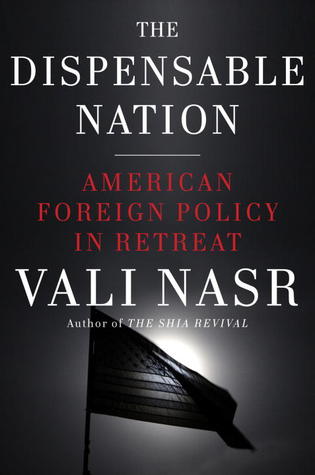Title: The Dispensable Nation: American Foreign Policy in Retreat
Author: Vali Nasr
Format: Hardcover
Publisher: Doubleday
Publish Date: April 16, 2013
Source: Library
What's the Story?:
From Goodreads.com: "Vali Nasr, author of the groundbreaking The Shia Revival, worked closely with Hillary Clinton at the State Department on Afghan and Pakistani affairs. In The Dispensable Nation,
he takes us behind the scenes to show how Secretary Clinton and her
ally, Ambassador Richard Holbrooke, were thwarted in their efforts to
guide an ambitious policy in South Asia and the Middle East. Instead,
four years of presidential leadership and billions of dollars of U.S.
spending failed to advance democracy and development, producing mainly
rage at the United States for its perceived indifference to the fate of
the region.
After taking office in 2009, the
Obama administration had an opportunity to fundamentally reshape
American foreign policy, Nasr argues, but its fear of political backlash
and the specter of terrorism drove it to pursue the same questionable
strategies as its predecessor. Meanwhile, the true economic threats to
U.S. power, China and Russia, were quietly expanding their influence in
places where America has long held sway. "
My Two Cents:
"The
Dispensable Nation" is a grim look at American foreign policy and where
the author thinks that it is going . Nasr worked in the White House
with Hillary Clinton as the Secretary of State and Richard Holbrooke, a
much renowned foreign policy mind also in the State Department. Nasr has
an axe to grind of sorts with Obama's foreign policy and for the most
part, he makes a very good case throughout the book.
It was a
fascinating read. It is easy to criticize things like foreign policy,
which has so many moving parts and things that must be considered, from
the outside. I am always more fascinated by those that have been on the
front lines of making big decisions to see how they felt about the
decisions that were made.
The book is broken down into different
topical sections. I thought this worked really well for the subject
matter in order not to overwhelm the reader. Although this book is
filled with a lot of criticism for what the author sees as failings, I
liked that the author also included other ways forward that should be
considered by those that make and carry out foreign policy. I like books
that stick with me long after the last page. This book gave me a lot to
think about. It's a great read for those that have a keen interest in
the difficult things that foreign policy makers face every day!



No comments:
Post a Comment
Hi! Welcome to A Bookish Affair. If you leave a comment, I will try to either reply here or on your site!
As of 6/6/2011, this book is now an awards free zone. While I appreciate the awards, I would rather stick to reviewing more great books for you than trying to fill the requirements.